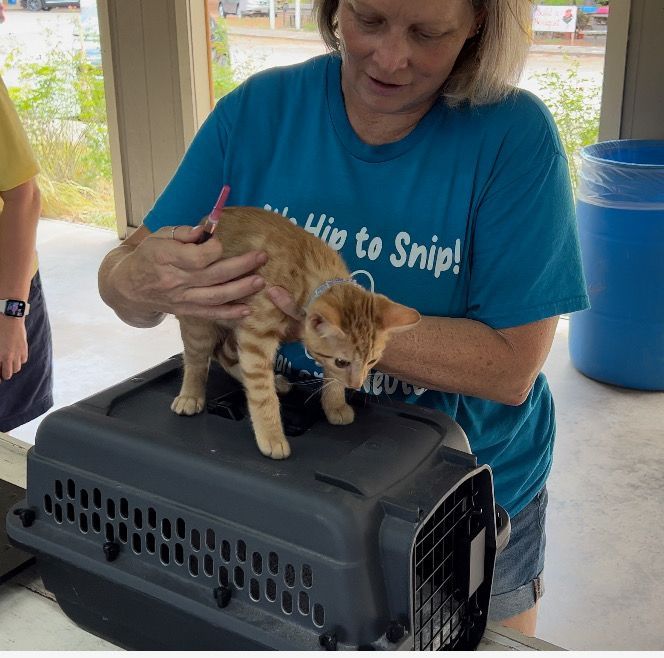Microchipping and Vaccinations
Microchipping and vaccinating your pets are two of the most important steps you can take to ensure their health and safety. Vaccinations protect your furry companions from a variety of potentially serious and even fatal diseases, while a microchip, a tiny device implanted under your pet's skin, can help reunite you if your pet ever gets lost or separated from you. It's a simple, relatively painless procedure that can make all the difference in a moment of crisis.
Here at Blue Collar Mutts Rescue, we deeply understand the importance of these measures. That's why we offer free or low-cost vaccination and microchipping assistance to our community. These services are made possible by the generous donations and partnerships we receive. It's a shining example of the collective power of our community - each donation, no matter how small, contributes directly to the safety and wellbeing of our pets. Our partners, too, play a crucial role in making these services affordable and accessible to as many pet owners as possible. Together, we're not just improving individual animal lives, but strengthening the overall health and safety of our pet-loving community.

Get your pet microchipped or vaccinated
Register or visit one of our free clinics to get your pet vaccinated or a microchip. We will register the chip with your contact information on the spot!
Check our calendar for the next free or low cost clinic!
Frequently Asked Questions
About Microchipping
A dog microchip is a tiny device, about the size of a grain of rice, that serves as a permanent form of identification for your pet. This microchip carries a unique identification number, and it's implanted under your dog's skin, typically between the shoulder blades, through a procedure that's quick and similar to giving a vaccination.
The microchip itself doesn't have a battery or any power source. Instead, it's designed to be activated by a scanner that a shelter or vet can use. When the scanner is passed over your dog's body, it sends out a radio frequency that activates the microchip, prompting it to transmit the unique identification number back to the scanner.
It's important to note that a microchip is not a GPS device, and it cannot track your pet's location. Instead, when the microchip is scanned and the unique ID number is retrieved, this number can be entered into a database to pull up the pet owner's contact information. This is why it's crucial to register the microchip and keep your contact information up to date.
The microchip lasts the lifetime of your pet, and it greatly increases the chances that you'll be reunited with your dog if they ever become lost. It's a simple, cost-effective tool that can provide peace of mind, knowing that your pet has a form of identification that can't slip off, be removed, or become unreadable over time like a collar or tag.
About Vaccines
What is a Dog Vaccine?
A dog vaccine is a scientifically prepared substance designed to stimulate a dog's immune system to recognize and fight specific diseases. It works by exposing the immune system to a harmless form of a disease (like a killed or weakened bacteria or virus), allowing the body to learn how to protect itself should it encounter the actual disease in the future. Vaccines are administered through injections and are crucial in maintaining your pet's health.
Importance of Vaccinating Our Animals
Vaccinating our pets is an essential part of responsible pet ownership. Vaccines protect our dogs against a variety of potentially serious and even life-threatening diseases, including rabies, distemper, parvovirus, and many others. They not only keep our pets healthy but also prevent the spread of these diseases in the pet population. This protection is particularly vital for puppies, who may not have a fully developed immune system.
In addition to protecting individual animals and the broader pet community, some vaccinations also safeguard human health. For instance, the rabies vaccine is crucial in preventing the transmission of this deadly disease to humans.
Blue Collar Mutts Rescue's Role
Understanding the importance of pet vaccinations, Blue Collar Mutts Rescue is dedicated to helping ensure all pets in our community have access to this vital health resource. We're proud to offer low-cost vaccination services, helping to remove the financial barrier that can sometimes prevent pet owners from keeping their pets' vaccinations up-to-date.
How You Can Help
All of our services including our spaying and neutering clinics, low-cost vaccination and microchipping services are made possible through the generosity of our donors and partners. Every donation, no matter the size, contributes directly to a pet's health and well-being, enabling us to provide this essential service. We encourage everyone to support this initiative - together, we can ensure all pets in our community are protected and live healthier, happier lives.
